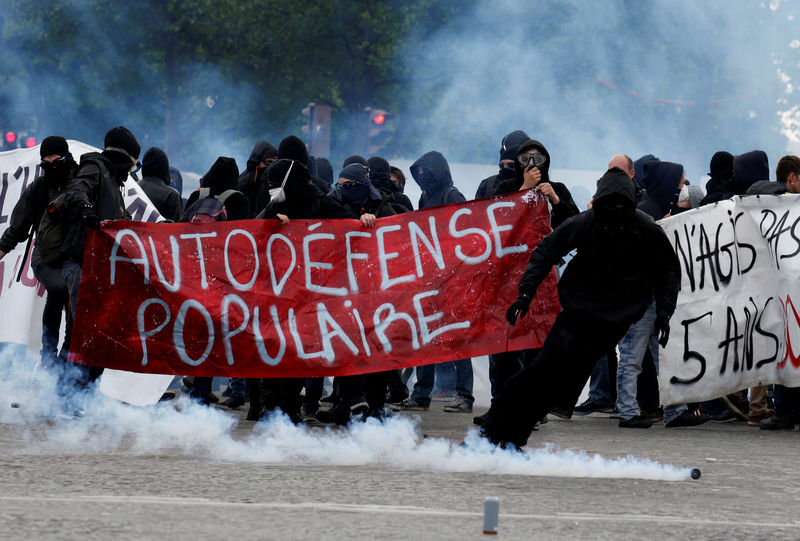By Larry King
LONDON (Reuters) - Europeans took to the streets on Monday, celebrating the international workers' holiday of May Day with an assortment of rallies and demonstrations, which in France turned violent as protesters threw petrol bombs at police.
One Paris police officer was seriously burnt and two others injured in confrontations with protesters.
In Turkey, police fired tear gas and rubber bullets to break up demonstrations and arrested hundreds.
A small group of Italian demonstrators clashed with police as they tried to break through a police barrier in the northern city of Turin. The spokesman for Belgium's Workers Party was knifed in the leg at a rally in Liege.
Elsewhere, South Africa's President Jacob Zuma abruptly left a rally he was due to address as workers booed him and fights broke out between his supporters and opponents.
In the United States, unions and activists planned protests against U.S. President Donald Trump.
In Paris, protesters threw petrol bombs and makeshift missiles at police, injuring at least three officers. Television showed police officers trying to shake out flames from their riot gear and clouds of tear gas enveloping the streets around the Bastille monument.
The clashes foreshadowed the approaching confrontation between Emmanuel Macron and Marine Le Pen, the two winners of the first round of France's presidential election. They will meet in a second-round vote on Sunday, and each verbally attacked the other at May Day rallies.
The centrist Macron evoked the memory of a May Day 22 years ago as he tried to paint the eurosceptic, anti-immigration Le Pen as an extremist. On that day, a young Moroccan man drowned after being pushed into the River Seine by supporters of Le Pen's National Front, led then by her father, Jean-Marie.
For her part, Le Pen portrayed Macron as a clone of the outgoing president, the highly unpopular Francois Hollande. She called for France to reclaim its "independence" from the European Union, an institution Macron supports.
Similarly, the violence in Turkey echoed clashes in last month's referendum between those who backed giving President Tayyip Erdogan sweeping new powers and those who opposed him. Erdogan narrowly won that referendum.
May Day protests are an annual event in Turkey, but this year's holiday takes place in the uneasy aftermath of last July's failed coup, in which 240 people died. Since then, about 120,000 people have been suspended or sacked from their jobs in a series of purges. More than 40,000 have been arrested.

Turkish unions said they would not attempt to march this year on Taksim Square (NYSE:SQ), a traditional rallying point for anti-government protests that has been declared off-limits for demonstrators. Nonetheless, dozens of people were rounded up for trying to get to the square. More than 200 were detained overall, police said.